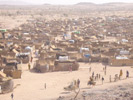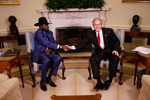New Bombings in Darfur

Reports on the wire of fresh Sudanese government air attacks in Darfur after a relative lull. With the International Criminal Court likely to move forward with an indictment of the Sudanese President, and an Obama Administration that has advocated instituting a no-fly zone poised to take office, President Bashir may be feeling increasingly desperate and hoping that the international community will essentially reward him for bad behavior by calling off the court ...
Shameless attack on aid groups

The LA Times weighs in on the Bush-Darfur airlift. The Times, not surprisingly, comes down, as we have, on the “too little, too late” theme. However, the Times also highlights Stephen Hadley’s push back against New York Times Columnist Nicholas Kristof. From the editorial, “Hadley acknowledged Monday that military responses had been considered and rejected, but he said the decision was driven by pleas from leading church, advocacy and humanitarian organizations that feared such actions would only make things worse for Darfuris.” This really is shameless on Hadley’s (and, by extension, Bush’s) part: blaming humanitarian organizations for blocking an effective ...
Cell Phones and Congo’s Women Op-Ed

In an op-ed from our own John Prendergast and actor/activist Robin Wright Penn in the San Francisco Chronicle, the two discuss the huge role that Congo’s vast mineral wealth plays in that country’s continuing violence.(Robin has been a great supporter of our work and efforts to improve the lives of Congo’s women, and we cannot say enough nice things about her.) Make sure to visit our Raise Hope for Congo site and view the infographic on Congo’s resources as well ...
More on the Bush Airlift

Both the New York Times and Washington Post have more on the Bush Administration's decision to push through an emergency airlift of supplies to the United Nations Mission in Darfur.It now seems even more obvious that this decision has more to do with making President Bush feel better about himself and his legacy than fixing the situation in Darfur. The announcement gave President Bush something to say during his photo op with Sudanese First Vice President Salva Kir at the White House, but does little to change the situation on the ground in a meaningful way. Bush went out of ...
No News is not Good News
Tara Sonenshine, who is very savvy about the media, has a good post up on Huffington about the continued economic woes of the newspaper business and its impact on foreign reporting. Coverage of international affairs is often the first to be sacrificed as papers look to cut costs, and this is a real tragedy. People certainly have lively debates about whether “the CNN effect” drives U.S. foreign policy or not, but it seems self-evident that fewer reporters on the ground will make the work of combating mass atrocities and war crimes harder, not easier ...
Murder by Numbers
A very interesting piece in the Washington Post today on how people respond to suffering and mass atrocities. The article features comments not only from my colleague, John Prendergast, but insights from the research of Paul Slovic. Slovic’s basic thesis: people’s emotional response to tragedy and suffering essentially becomes watered-down and more diffuse as the sheer number of people suffering rises. The fundamental logic is generally sound, but I would also ask: why then did people respond so viscerally to the attacks of September 11 and the mass casualties inflicted on that horrible day? Several factors: the attacks were intensively ...
Too Little; Too Late
In its waning weeks, the Bush Administration appears to be feeling a new urgency in dealing with Darfur. The administration just announced a new emergency airlift of vehicles and supplies to the UN Mission in Darfur. What exactly is being supplied is still unclear, although the administration says this move falls short of direct U.S. military involvement in the conflict. It would be interesting to know the degree to which this decision was coordinated with the incoming Obama team ...
More on MSF
In addition to Maggie’s blog above, there is another important point about the MSF “Top Ten” list of humanitarian crises. MSF first compiled this list in in reaction to the underreported famine in southern Sudan. Sadly, ten years later, Sudan is still on the list, now primarily for the situation in Darfur. This underscores the point that most of the profound humanitarian tragedies on the MSF list are distinctly man-made crises, and the situation in Sudan will not substantially improve until the international community deals with the governance problems that lie at the heart of Sudan’s repeated troubles. You can ...
The price of Iraq
Secretary of State Condi Rice was on NBC’s Meet the Press with David Gregory and was asked about Darfur in a fascinating exchange. QUESTION: “Why didn’t we act unilaterally?” SECRETARY RICE: Well, because acting unilaterally in an Arab country – or in a Muslim country that is that complex, that far away, really did not seem to be an option. The President considered it. He thought about it. He thought about what we could do unilaterally. But in fact, instead, we’ve tried to mobilize the international community and international opinion. And frankly, given that just a couple of years ago ...
African Solutions?

As the conflict in Zimbabwe worsens, with Mugabe’s police beating nurses and doctors who dared to protest a dangerous cholera epidemic and their own abysmal working conditions, the international outcry has come from predictable quarters. British PM Gordon Brown has called on Mugabe to resign (video here), U.S. Secretary of State Condi Rice has said it is “well past time” for Mugabe to go, and the Washington Post editorial board has also called on Mugabe to step down. But now it is time for more Africans to speak up, and they could make the critical difference. South Africa’s diffidence in ...

